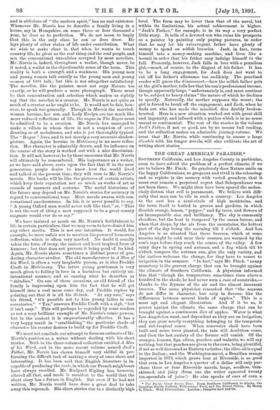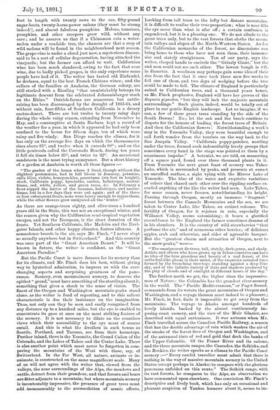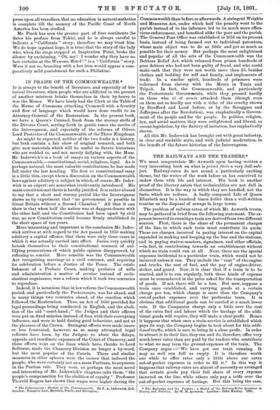THE GREAT AMERICAN PARADISE.*
SOUTHERN California, and Los Angeles County in particular, seem to have solved the problem of a perfect climate, if we are to believe Mr. nick. So graciously does Nature smile on the happy Californians, so gorgeous and vivid is the colouring, and so replete is the scenery with varied grandeur, that it must ever 'remain a perpetual regret that Schopenhaner was not born there. We might then have been spared the melan- choly dictum that evil is paramount. We believe with diffi- culty that man can be vile in such a country. Los Angeles to the east has a semi-circle of high mountains, and the town itself is buried in groves and gardens, in which flourish orange, lemon, " pepper," and fig trees, and flowers of an incomparable size and brilliancy. The sky is commonly cloudless, but the heat is tempered by the ocean breeze, and when that drops, by the air from the mountains, the hottest part of the day being the morning till 2 o'clock. And Los Angeles is so situated that these breezes, which at some seasons might be cold near their sources, are warmed by the sun's rays before they reach the centre of the valley. A few rainy days in spring and autumn, and a fog which till 10 o'clock tempers the autumn sun, give the only variety, and the natives welcome the change, for they have to resort to irrigation in the summer. " In fact," says Mr. Finch, " sunny monotony is the gravest charge that can be brought against the climate of Southern California. A physician informed him that " though the temperature sometimes rises above a hundred in the shade, he had never seen a case of sunstroke,— thanks to the dryness of the air and the almost incessant breezes. The same physician remarked that "the seasons do not differ in character, but only in flavour, like the differences between several kinds of apples." This is a most apt and elegant illustration. And if it be so, it proves against the climate the same charge that can be brought against a continuous diet of apples. Water is what Los Angelenos want, and dependent as they are on irrigation, they can grow nearly everything belonging to the temperate and sub-tropical zones. When reservoirs shall have been built and more trees planted, the rain will doubtless come, and then the last anxiety of the farmer will vanish. Of the oranges, lemons, figs, olives, peaches, and walnuts, we will say nothing, but that peaches are given to the cows, being plentiful, if not so well flavoured as Eastern varieties ; the olive-oil is equal to the Italian ; and the Washington-navel, a Brazilian orange imported in 1873, which grows best at Riverside, is so good that even in Los Angeles a quarter of a dollar will only pur- chase three or four Riverside navels, large, seedless, thin- skinned, and juicy (from one the writer squeezed twenty tea-spoonfuls of juice !) He also speaks of ears of corn a • The Pacific Coast Scenic Tour. From Southern California to Alaska, the Canadian Pacific Railway, Yellowstone Park, and the Grand Callon. By Henry T. Finch. With Illustrations. London : Sampson Low and Co.
foot in length with twenty rows to the ear, fifty-pound sugar-beets, twenty-horse-power onions (they must be strong indeed!), and almost fabulous pumpkins. Melons, tomatoes, pumpkins, and other creepers grow wild, without any care ; and he assures us that if a Chinaman eats a water- melon under a roadside tree, the chances are that a crop of wild melons will be found in the neighbourhood next season. The grape-vine is under a cloud just now, a mysterious disease, said to be a sort of cellular degeneration, having attacked the vineyards ; but the farmer can afford to wait. Californian wine has been much slandered, owing to the fact that sour wine, due to badly picked grapes, is the only experience some people have had of it. The writer has tasted old. Zinfandel, he declares, equal to the best French Chateau wines ; and the cellars of the families at Anaheim, the German colony, are still stocked with a Riesling "that unmistakably betrays its legitimate descent from the celebrated Johannisberger stock on the Rhine." Ostrich-farms are numerous, but cattle- raising has been discouraged by the drought of 1863-64, and without rain, four-fifths of Southern California is a dreary cactus-desert. There are but twelve to twenty rainy days during the whole rainy season, extending from November to May, and a consumptive at Santa Barbara kept a record of the weather for a year, in which it appeared he had only been confined to the house for fifteen days, ten of which were rainy and five windy. San Diego reaches the climax, for it has only on the average five days on which the thermometer rises above 85°, and twelve when it exceeds 80° ; and on the little peninsula called the Coronado Beach, during ten years it fell six times below 35°, and twice to 32°. An occasional sandstorm is the most trying annoyance. But a short history of a garden at Anaheim is worth all these figures
"The garden of the house whore I lived, though without the slightest pretensions, had in full bloom in January, petunias, calla lilies, violets, honeysuckles, geraniums (six feet in height), stock, California poppy, hyacinths, smilax, heliotropes, nastur- tiums, red, white, yellow, and green roses, &c. In February a frost nipped the leaves of the bananas, heliotropes, and nastur- tiums, but in a few days they were out again ; and of the three or four subsequent frosts, none were heavy enough to injure them, while the other flowers grew uninjured all the ' winter.' "
As there are orange-trees eighty, and olive-trees a hundred years old in the State, this was not an exceptional winter, and the reason, given why the Californian semi-tropical vegetation escapes, and not the European, is the short duration of the frosts. Yet Southern California, like Madeira and the Navi- gator Islands, and other happy climates, fosters idleness. A somnolence broods in the air, says Mr. Pluck, " I never slept so soundly anywhere but in Switzerland." And this country was once part of the " Great American Desert." It will be known in future, the writer is confident, as the " Great American Paradise."
But the, Pacific Coast is more famous for its scenery than for its climate, and Mr. Frock does his best, without giving way to hysterical admiration, to impress us with the ever- changing aspects and surprising greatness of the pano- ramas. Scenery, even mountainous scenery, to deserve the epithet " grand," must have something of the startling about it, something that gives a shock to the sense of vision. The finest of the Oregon and Washington mountain-peaks stand alone, as the writer is fond of repeating, and to this salient characteristic is due their insistance on the imagination. Thus, not only can they be seen and easily recognised from any distance up to a hundred miles, but the eye is enabled to concentrate its gaze at once on the most striking feature of the scenery. It .is not necessary to dilate on the countless views which their accessibility to the eye must of. course entail. And this is what the dwellers in .such towns as Seattle, Portland, and Tacoma, see from their housetops. Further inland, there is the Yosemite, the Grand Caiion of the
Colorado, and the Lakes of Tahoe and the Crater Lake. There is also,another point which must never be forgotten in com- paring the mountains of the West with those, say, of Switzerland. In the Far West, all nature, animate or in- animate,• is constructed on the same magnificent scale Many
of, ma will not agree with the writer that, viewed ,from the valleys, the near surroundings of the Alps, the meadows and cattle, detract from their grandeur, and that forests and bears are fitter:adjuncts to a mountain; but where mountain scenery is incontestably impressive, the presence of great trees must add immeasurably to the accumulation of 'scenic effects. Looking from tall trees to the lofty but distant mountains, it is difficult to realise their true proportion ; what is near fills
the eye more than what is afar off ; a certain confusion is engendered, but it is a pleasing one. We do not allude to the great trees only, but to the vast forests that clothe the moun-
tain valleys and slopes of the North-Western States. As for the Californian monarchs of the forest, no dimensions can bring home to those who have not seen them, their immense size and stately straightness. Ten of our party, says the writer, clasped hands to encircle the " Grizzly Giant," but the end men could not see each other. The lowest bough is 6 ft. in diameter. A woodman may perhaps gain some idea of their size from the fact that it once took three men five weeks to fell one of them, and two days of wedging before the tree could be made to fall. The climate of England is particularly suited to Californian trees, and a thousand years hence, as Mr. Buck prophesies, England will have her groves of the Sequoia gigantea, "but they will lack the majestic mountain surroundings." Such giants, indeed, would be totally out of place in our gentle English landscape. Let us imagine, if we can, a few of these great trees standing by the side of the South Downs ! No ; let the oak and the beech continue to dispute for the honour of leading the forest trees of Britain. And then the Californian flowers ! Notwithstanding a week's stay in the Yosemite Valley, they were beantiful enough to call forth wonder from the tourists on the way back to the San Joaquin Valley. " California poppy-patches, nestling under the trees, formed such indescribably lovely groups that sometimes every hand in the stage was pointed at them by a unanimous impulse." A botanist, we are told, on measuring off a square yard, found over three thousand plants in it. From Yosemite the next great feast of scenery was Tahoe Lake, which is surrounded by peaks, and presents at sunset an unruffled surface, a sight vying with the Mirror Lake cf Yosemite. The blue of the water and exquisite variations of colour that chased each other over the rippling surface ex- ceeded anything of the like the writer had seen. Lake Tahoe, for some reason, never freezes, notwithstanding its height. Passing through Oregon, mostly an immense " fragrant " forest between the Cascade Mountains and the sea, we are taken to Crater Lake, like Tahoe, an extinct volcano. The fertility of Oregon, for it rejoices in rain, especially the Willamet Valley, seems astonishing ; it bears a glorified. resemblance to the England the farmer sometimes dreams'of in his slumbers. It is the country of wild strawberries "that perfume the air," and of numerous other berries ; of. delicious apples, crab and otherwise, and cider of agreeable bouquet.
But the "greatest charm and attraction of Oregon, next to the snow-peaks," were-
" The omnipresent fir-trees, tall, stately, dark-green, and shady. Artists and others who have grown up in firless countries can have no idea of the true grandeur and beauty of a real forest, of the cathedral-like gloom in their midst, of the exquisite serrated lines formed by the branching tree-tops standing against a deep blue sky, and of the infinite variety of tints and shadows produced by the play of clouds and of sunlight at different hours of the day.
The further north we get, the higher rises the impressive- ness of Nature ; the Columbia has the grandest river-scenery in the world. The " Pacific Mediterranean," or Puget Sound, commands from its waters the great mountains of Oregon and Washington, and a voyage thereon must indeed be a pleasure ; Mr. Finch, in fact, finds it impossible to get away from the mountains. The voyage to Alaska amongst hundreds of lovely islands, backed by the almost continuously im- posing coast scenery, and the view of the Muir Glacier, are described with equal enthusiasm. It was autumn when Mr. .Finck travelled across the Canadian Pacific Railway, a season that has the double advantage of rain•which washes the air of the smoke of the forest fires of Oregon and Washington, and of the autumnal tints of red and gold that deck the banks of the Upper Columbia. Of the Fraser River and its caiions, and the three mountain ranges, the Cascades, the •Selkirks, and the Rockies, the writer speaks-as a climax to the Pacific Coast scenery :—" Every candid traveller must admit- that there is nothing in the way of massive mountain• scenery in the United States (except perhaps in Alaska) to compare with the glorious panorama unfolded on this route." The Selkirk range, with its vast forests, he compares to the Alps, an observation we have commented upon elsewhere. One conviction lir. Finck's descriptive and lively book, which bas.only an occasional and pleasant suspicion of Yankee humour about it, seems to im- press upon all travellers, that no education in natural a3sthetics is complete till the scenery of the Pacific Coast of North America has been studied.
Mr. Ruck has seen the greater part of four continents (he dates his preface from Tokio), and he is always careful to indicate a " California " story; therefore we may trust him. We do hope (against hope, it is true) that the story of the lady who, when the stage stopped at Inspiration Point, broke the silence by exclaiming, " Oh, my ! I wonder why they have no lace curtains at the Wawona Hotel !" is a " California" story. Were it not so, branding with a hot iron would appear a com- paratively mild punishment for such a Philistine.




















































 Previous page
Previous page